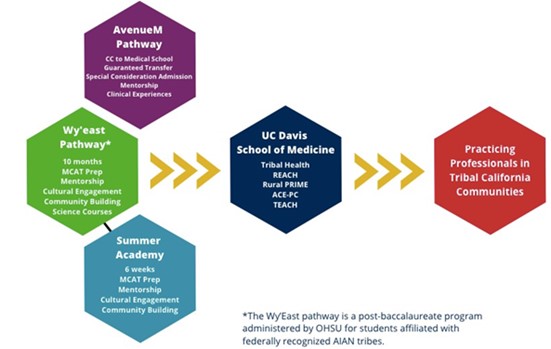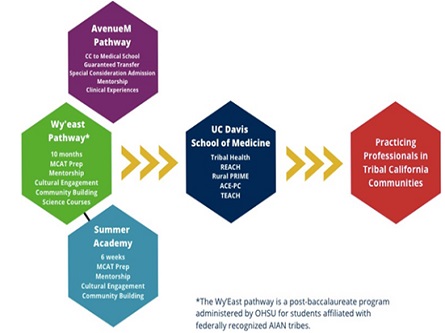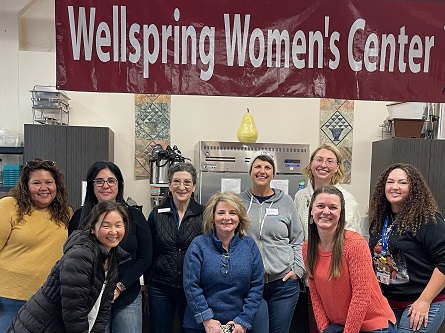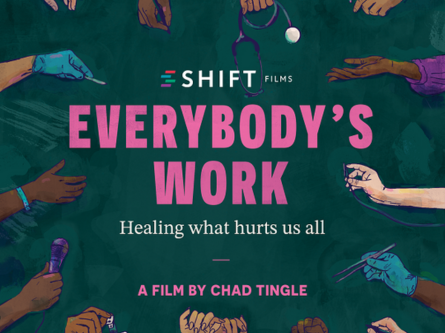By Charlene K. Green, PsyD (she/her/hers)
Director, Admissions | Office of Student and Resident Diversity (within OHEDI and ODEI)
University of California, Davis | School of Medicine
Greetings! I’d like to first start this blog with acknowledging the land I am currently on. This statement is not my own but adapted from the land acknowledgement of the Sacramento Native American Health Center (SNAHC). This area was, and still is, the Tribal land of the Nisenan people. Sacramento was a gathering place for many local Tribes who have lived throughout the central valley and the foothills for generations and were the original stewards of this land. I would like to acknowledge the Southern Maidu people to the North, the Valley and Plains Miwok/ Me-Wuk Peoples to the south of the American River, and the Patwin Wintun Peoples to the west of the Sacramento River. I would also like to honor the Wilton Rancheria, the only federally recognized tribe in Sacramento County. I acknowledge that I am on the tribal lands of Sacramento’s Indigenous people.
As California faces a critical shortage of physicians, UC Davis School of Medicine (UC Davis) is building the workforce to meet the needs of Northern California’s historically underserved communities. For the past 3+ years, the UC Davis has been working in partnership with many education institutions, community-based organizations, and tribal health clinics to work on the critical healthcare workforce needs of American Indian and Alaska Native (AIAN) populations facing significant health disparities. A diverse physician workforce improves patient satisfaction, trust and adherence; provides critical access in medically underserved areas; and reduces long-standing health disparities in marginalized communities. Specifically with AIAN populations, there is great urgency to identify pre-med students with significant ties to AIAN communities and train culturally proficient physicians committed to practicing medicine in these areas of need. To provide California’s Indigenous people equitable and culturally sensitive health care, we must eliminate barriers for promising AIAN pre-medical scholars and build pathways between UC Davis and the many tribal communities who have inhabited this region for generations. Here is an overview of our current efforts:
The Wy’East pathway is 10-month post-baccalaureate program administered by Oregon Health Science University (OHSU) that prepares AIAN students from federally recognized tribes to successfully enter and complete medical school. It is a partnership between UC Davis, OHSU, and Washington State University. Upon successful completion of Wy’East, participants receive priority admission considerations at the participating medical schools. The goal for Wy’East scholars from Northern California is to eventually provide care to the region’s tribal communities.
RISE Summer Academy is also a partnership between UC Davis, OHSU, and Washington State University. We regionally target AIAN pre-medical scholars and provide intensive medical school application preparation, cultural engagement, and professional identify formation.
Avenue M is an early-assurance program for students with demonstrated commitment or potential to improve healthcare for underserved communities. Avenue M provides a seamless transition from community college to UC Davis, Sacramento State, or CalPoly Humboldt through an undergraduate transfer agreement. Participants will earn their undergraduate degree at one of these three institutions and receive priority admission consideration at UC Davis School of Medicine. They will receive supplemental education and clinical training focused on underserved communities in our state. Avenue M scholars will eventually practice in a California community experiencing a physician shortage.
The UC Davis Tribal Health Pathway (THP) is designed to provide students with the appropriate knowledge and skills to practice medicine in California’s urban and rural tribal communities. UC Davis aims to partner with communities to recruit and support students on their journey to careers in medicine. Community health and education leaders may identify and support promising pre-health students by submitting a letter of recommendation for their application to medical school at UC Davis. THP scholars will matriculate to UC Davis medical school through the traditional pathway, the Wy’East pathway, the Avenue M pathway, and other targeted pre-medical recruitment efforts with regional tribal communities. The THP curriculum includes longitudinal preceptorship and mentoring, professional identity formation emphasizing tribal cultural tenets, and clinical and didactic experiences focused on the health of tribal communities. The curriculum builds on the successful framework of existing Community Health Scholar (CHS) pathways at UC Davis including Rural PRIME. CHS students work together in the classroom, learning from each other and enriching the CHS curriculum, which focuses on health of underserved communities. THP scholars will participate in additional pathway-specific experiential learning.
We are very proud of our progress so far on these efforts and we are so grateful to the countless partners who have provided input and support as we continue to implement and grow these efforts!






